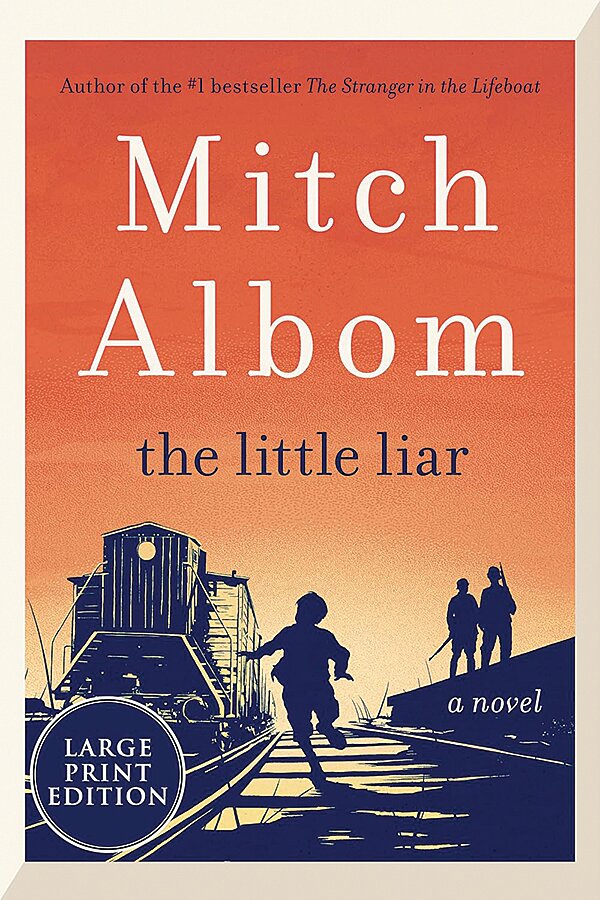A gripping, harrowing story of truth, and of loss
Powerful and riveting, “The Little Liar” focuses on 11-year-old Nico Kripis, who has never told a lie, because his Jewish grandfather told him that “God is always watching.” The blond, blue-eyed, beautiful child has taken this to heart, intent on always telling the truth.
This item is available in full to subscribers.
Please log in to continue |
Register to post eventsIf you'd like to post an event to our calendar, you can create a free account by clicking here. Note that free accounts do not have access to our subscriber-only content. |
Day pass subscribers
Are you a day pass subscriber who needs to log in? Click here to continue.
A gripping, harrowing story of truth, and of loss
‘The Little Liar’
By Mitch Albom
Powerful and riveting, “The Little Liar” focuses on 11-year-old Nico Kripis, who has never told a lie, because his Jewish grandfather told him that “God is always watching.” The blond, blue-eyed, beautiful child has taken this to heart, intent on always telling the truth. “Truth” is actually the narrator of this tale of four protagonists: Nico; his older brother Sebastian; Fannie, whom both brothers adore; and Nazi officer Udo Graf, who has charge of rounding up Jews in their town of Salonika in Greece.
When the Germans invade the family home in 1938, Nico and Fannie are playing a game by hiding in a hidden recess where a kiss will bind them together forever. All but these two will be arrested and taken to a ghetto to await transportation to the concentration camps.
When young Fannie runs home to find her parents, she too is taken. Soon Udo will confiscate Nico’s family home to find the child hiding there. The shrewd and devious Nazi finds the boy’s naivete and gullibility amusing, Nico even brings the man hot towels to soothe his pounding headache.
Realizing he could use the boy for his own ends, he convinces Nico to accompany him to the train station, where wildly panicking Jews, his own family included, are being hustled into boxcars. Udo convinces Nico to circulate among them on the platform with a message that will help them so they will not be so scared: “The trains are going north to Poland where there will be jobs and new homes where all families will be reunited.”
This is Nico’s first lie ever, but one that will have serious repercussions for all of them. By a miracle, Fannie survives when she escapes and finds refuge with a lonely widow. Sebastian, who survives the camps, devotes his life to revenge, not only on those Germans who persecuted him, including Udo, but also the favored child Nico of whom Sebastian has always been jealous. Believing his brother was a willing participant in their betrayal, he is obsessed with retaliation.
The story spans 1930 to 1983, during which the various participants will travel the world: New York City, California, Hungary, Israel, Austria, Athens. The survivors will meet again in Salonika at a commemoration for the 40th anniversary of the first train to travel from Salonika to Auschwitz. Salonika, once home to more than 50,000 Jews, had less than 2,000 survivors. It was here on this train platform that so many Greek families saw their family bonds forever severed. And for this reason, Sebastian has devoted his life as a Nazi hunter to finding and punishing the perpetrators. All builds to a riveting and stunning climax.
There are so many dynamics at work in this book: family bonds and relationships; intense sibling rivalry; the stirrings of young love; the horror of the “Final Solution,” its evil brutality and dehumanization; the courage of non-Jews to harbor escapees; greed, trickery and duplicity; forgiveness and salvation.
A most effective technique employed by the author to engage the reader is telling the story in the first person, personifying “Truth.” One universal truth is loss. Everyone in their lifetime will experience it. And this is a story of loss: loss of innocence, loss of home, of family, of possessions, of dignity, of freedom, of humanity.
This is Albom at his finest; 41 million copies of his books, translated into 47 languages, have sold worldwide. Many weeks on the best-seller lists, this one is utterly gripping, harrowing and compelling.
Donna Bruno is a prizewinning author and poet recently recognized with four awards by National League of American Pen Women. In addition, her most recent book, “What No Child Should See,” was accepted by the U.S. Holocaust Memorial Museum in Washington, DC for inclusion in its archives.






